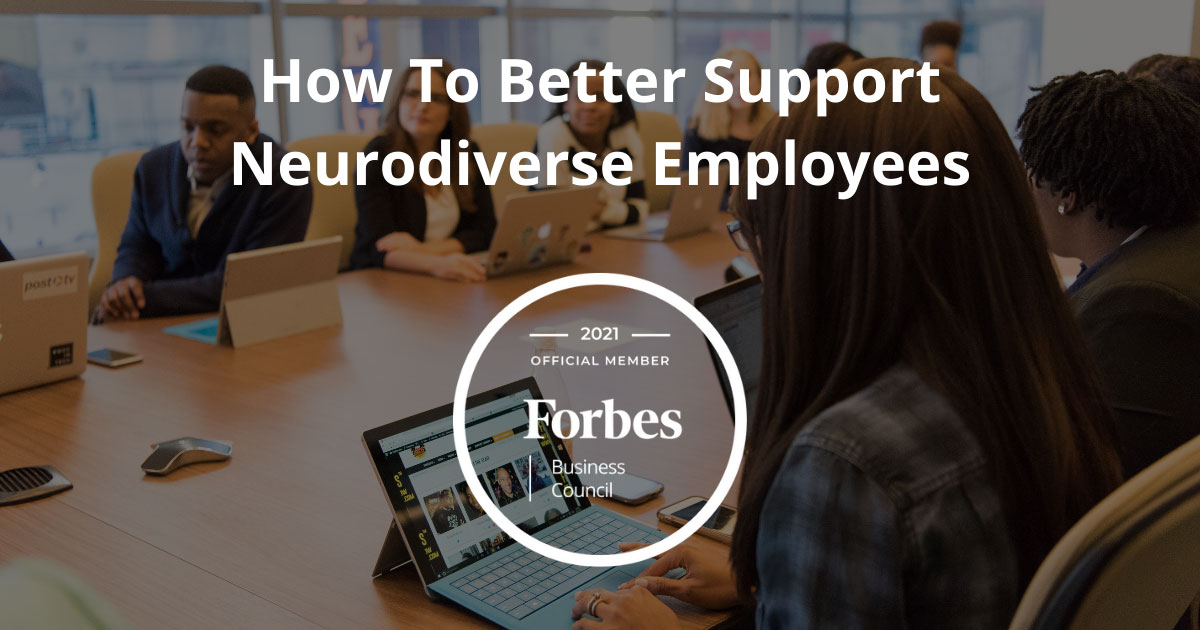Diversity and inclusion have recently become a hot-button concern of people both in and outside of major companies. Not only does it strengthen a company’s workforce, it can also drive revenue in ways business leaders could not have anticipated before.
While racial and gender-based diversity come up more often, neurodiversity in the workforce also has the potential to expand business possibilities if neurodiverse employees feel heard and respected.
To help companies’ neurodiverse employees feel empowered, members of Forbes Business Council shared ways companies can alter their workspaces to better support neurodiversity overall.
1. Set The Example For Others
About 1 in 8 people are considered neurodiverse. Leveraging non-linear thinking is linked to greater innovation and better problem-solving. Organizations that embrace diversity understand that the benefits of neurodiversity will empower employees to step forward and ask for needed accommodations. Sometimes it’s as simple as sending agendas and slide decks in advance. – Jackie Ferguson, The Diversity Movement
2. Engage With Neurodiverse Communities
Oftentimes diversity is treated as a box to check when it should include seeking individuals who think outside the box and can help transform company culture. Organizations can support neurodiversity by partnering and engaging with community programs that serve these individuals. By creating a pipeline between the company and the community, the invisible diversity gap can be closed. – Monique Allen, Ma’at Enterprises, Inc
3. Host Unconscious Bias Trainings
Organizations can support neurodiverse employees by taking a thoughtful, deliberate and all-in approach to infusing inclusion and acceptance of all forms of diversity into company culture. Unconscious bias training should include educating your employees on understanding and working alongside neurodiverse teammates. A perceived disability or difference should never diminish an employee’s value to the team. – Venus Quates, LaunchTech
4. Rearrange The Workspace
Here, HR managers can take the leading role and make the workspace more adaptable for neurodiverse employees. They can identify the challenges and help to overcome them. Also, educating other employees towards neurodiverse thought processes will create a healthier environment. – Caroline Lee, CocoSign
5. Celebrate Diversity Through Social Activities
Strengths come from anywhere. Focus on building from the inside out and allow all employees to see the gems in each other. Applaud creativity, diversity of thought and preferences, and provide various ways of engagement to create connectivity in a variety of social opportunities (big and small) and to allow for all employees to mingle, connect and grow as a culture. Include all. – Silvia Mah, Ad Astra Ventures
6. Adapt The Way You Speak
Some neurodiverse talent may find challenges with nuance, irony and colloquialisms, so a simple way that managers can help is to implement a direct speaking approach as the organizational communication style. Understanding preferences in communication styles (oral, written, face-to-face, etc.) and adapting to your employees is critical across the board. – Sindhu Kutty, Kuroshio Consulting
7. Ask Employees What They Need
This is a topic not covered very widely, yet it is a gold mine! Tapping into this form of diversity is a must for any company that plans to improve company culture to any measurable degree. The success of any given team or workforce can depend upon something as simple as what colors they prefer in workspaces and what they are allowed to do on a break as a team. Tap into this and your company will win! – Olivia Friedman, Institute of Higher Global Studies
8. Lead With Empathy
This is a highly talented group of people. As with all, it starts with empathy. HR departments focused on utilizing high levels of cognitive empathy to identify the talents and foster them will yield significant benefits to their teams. Setting up gamification, tools and systems to support a fusion that allows more diversity without it being deeply based on genuine empathy may set a weak foundation. – Paul L. Gunn, KUOG Corporation
9. Play To Their Strengths While Understanding Weaknesses
Handling neurodiverse employees requires expert help, or at least help with basic knowledge in setting up their work schedules and setting the expectation level on their work output. Identifying their strengths and weaknesses is important, so the interview must be crafted in such a manner. Clarification must be given to other employees regarding neurodiverse employees to avoid differences of opinion. – Kiara Cancer, Extraordinary Headhunters LLC
10. Support Individualized Working Preferences
Fortune 500 companies are embracing neurodiversity as related hires can be beneficial to businesses. Learning the unique strengths and working styles of an employee and identifying where and how they fit into your organization is important. New interviewing techniques that give neurodiverse job candidates an opportunity to demonstrate their abilities in casual interactions with management are effective. – Muraly Srinarayanathas, Computek College
11. Create An Open Work Environment
Let’s start with the premise that our brains are hard-wired to recognize what’s similar and what’s different. We unconsciously filter differences all day long. Employees have an innate need to belong, feel included and be accepted. Be intentional about promoting connections and reinforce a communication model that promotes asking questions, sharing appreciation for differences and modeling compassion. – Loubna Noureddin, Mind Market Consultants
12. Educate Current Employees
It requires buy-in from all levels. First, educate. Make sure everyone knows about neurodiversity and why special accommodations may be necessary for such employees. It reduces resistance and increases compassion. Second, make accommodations. Change your hiring practices, work environment and methodologies. Finally, openly communicate with and include neurodiverse employees. – Alina Clark, CocoDoc
13. Build New Teams
Put diversity into action. Build cross-culture and cross-skills teams to identify new business opportunities and to solve new challenges. Utilizing such teams as a source for business growth improves communication at all levels and showcases the true advantages of a diverse organization through quantifiable results. Providing opportunities to contribute is the best way to support neurodiversity. – Pankaj Srivastava, Practicalspeak
14. Focus On Skills And Quality Of Work
Innovation requires a variety of people, including those who look at things differently and might not fit seamlessly into company culture. Focusing on skill sets and work products rather than social skills is paramount. Forgoing or not heavily weighing traditional in-person interviews is also key, as it creates a corporate culture that embraces and celebrates individual quirks. – Mainul Mondal, Ellipsis Health
15. Find Alternatives To Traditional Interview Questions
Remove personality tests and quizzes from hiring protocols and succession planning, and find alternatives to standardized testing used to confirm knowledge. Train hiring managers, recruiters and employees on active listening, communication, cognition and conflict styles. Build intellectual humility within team leads, managers and executives. – Mohammad Anwar, Softway
This article was also published on Forbes.com

